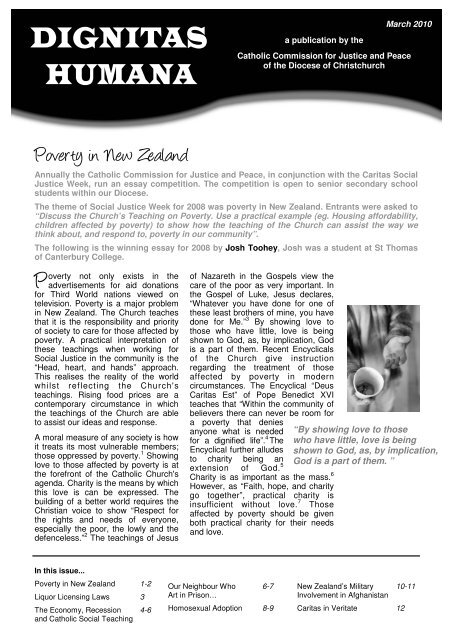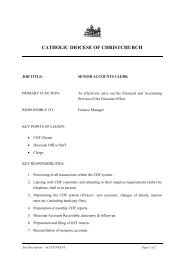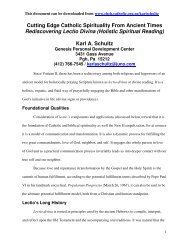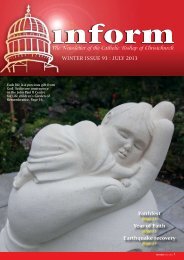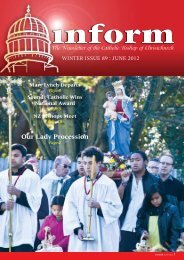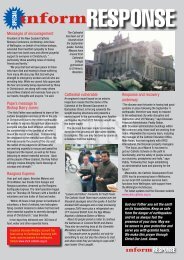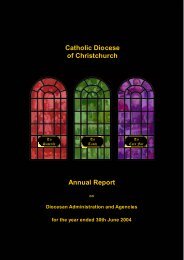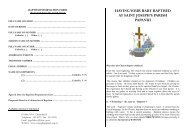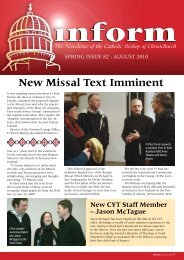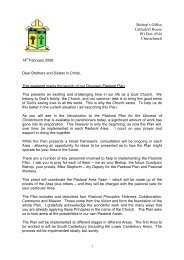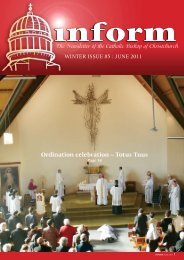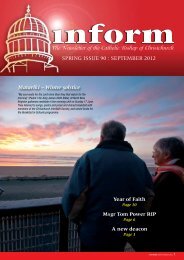Dignitas Humana - March 2010.pub - Catholic Diocese of Christchurch
Dignitas Humana - March 2010.pub - Catholic Diocese of Christchurch
Dignitas Humana - March 2010.pub - Catholic Diocese of Christchurch
Create successful ePaper yourself
Turn your PDF publications into a flip-book with our unique Google optimized e-Paper software.
<strong>March</strong> 2010a publication by the<strong>Catholic</strong> Commission for Justice and Peace<strong>of</strong> the <strong>Diocese</strong> <strong>of</strong> <strong>Christchurch</strong>Poverty in New ZealandAnnually the <strong>Catholic</strong> Commission for Justice and Peace, in conjunction with the Caritas SocialJustice Week, run an essay competition. The competition is open to senior secondary schoolstudents within our <strong>Diocese</strong>.The theme <strong>of</strong> Social Justice Week for 2008 was poverty in New Zealand. Entrants were asked to“Discuss the Church’s Teaching on Poverty. Use a practical example (eg. Housing affordability,children affected by poverty) to show how the teaching <strong>of</strong> the Church can assist the way wethink about, and respond to, poverty in our community”.The following is the winning essay for 2008 by Josh Toohey, Josh was a student at St Thomas<strong>of</strong> Canterbury College.overty not only exists in theP advertisements for aid donationsfor Third World nations viewed ontelevision. Poverty is a major problemin New Zealand. The Church teachesthat it is the responsibility and priority<strong>of</strong> society to care for those affected bypoverty. A practical interpretation <strong>of</strong>these teachings when working forSocial Justice in the community is the“Head, heart, and hands” approach.This realises the reality <strong>of</strong> the worldwhilst reflecting the Church'steachings. Rising food prices are acontemporary circumstance in whichthe teachings <strong>of</strong> the Church are ableto assist our ideas and response.A moral measure <strong>of</strong> any society is howit treats its most vulnerable members;those oppressed by poverty. 1 Showinglove to those affected by poverty is atthe forefront <strong>of</strong> the <strong>Catholic</strong> Church'sagenda. Charity is the means by whichthis love is can be expressed. Thebuilding <strong>of</strong> a better world requires theChristian voice to show “Respect forthe rights and needs <strong>of</strong> everyone,especially the poor, the lowly and thedefenceless.” 2 The teachings <strong>of</strong> Jesus<strong>of</strong> Nazareth in the Gospels view thecare <strong>of</strong> the poor as very important. Inthe Gospel <strong>of</strong> Luke, Jesus declares,“Whatever you have done for one <strong>of</strong>these least brothers <strong>of</strong> mine, you havedone for Me.” 3 By showing love tothose who have little, love is beingshown to God, as, by implication, Godis a part <strong>of</strong> them. Recent Encyclicals<strong>of</strong> the Church give instructionregarding the treatment <strong>of</strong> thoseaffected by poverty in moderncircumstances. The Encyclical “DeusCaritas Est” <strong>of</strong> Pope Benedict XVIteaches that “Within the community <strong>of</strong>believers there can never be room fora poverty that deniesanyone what is neededfor a dignified life”. 4 TheEncyclical further alludesto charity being anextension <strong>of</strong> God. 5Charity is as important as the mass. 6However, as “Faith, hope, and charitygo together”, practical charity isinsufficient without love. 7 Thoseaffected by poverty should be givenboth practical charity for their needsand love.“By showing love to thosewho have little, love is beingshown to God, as, by implication,God is a part <strong>of</strong> them. ”In this issue...Poverty in New Zealand 1-2Liquor Licensing Laws 3The Economy, Recessionand <strong>Catholic</strong> Social Teaching4-6Our Neighbour WhoArt in Prison…6-7Homosexual Adoption 8-9New Zealand’s MilitaryInvolvement in AfghanistanCaritas in Veritate 1210-111
The phrase “Head, heart, and hands” is anapproach that can be taken to practicallyinterpret the Churches teachings onpoverty. 8 It is easy to see poverty in thecommunity and choose to ignore it, seeing itas “not my problem”. Jesus recognised thisproblem and said, “You will listen and listenagain, but not understand, look and lookagain, but not perceive.” 9 However, it is theresponsibility <strong>of</strong> a Christian to crusade for“It is easy to see poverty in thecommunity and choose toignore it, seeing it as "not myproblem". Jesus recognisedthis problem and said, "Youwill listen and listen again, butnot understand, look and lookagain, but not perceive....”Social Justice,using the “head” tosee a situation. A“binocular vision” isthen used toe x a m i n e t h esituation, both inthe perspective <strong>of</strong>the Gospels andTwenty-first centuryreality. This allows a balanced perspectiveon a situation. The situation subsequentlymust be judged, using the heart. Both theGospels view <strong>of</strong> the Church's teaching onpoverty and reality are now evaluated. Theindividual is then able to use their hands toact responsibly and in a Christian manner.This approach allows Christians topractically interpret the teachings <strong>of</strong> theGospel in the modern world, and thenpractice Social Justice on the street.A practical instance <strong>of</strong> the Church'steaching on poverty being applied in thecommunity is in the response to rising foodprices. New Zealand is a food-producingnation, but still has frequent foodinsecurity. 10 Food prices have risen 10.6%from August 2007 to August 2008. 11 Thesection <strong>of</strong> New Zealand society that is mostvulnerable are those in the lower incomebrackets, already affected by poverty. Theycan afford it least. Wages have notincreased at the same rate as the rise infood prices, and even after large increasesin economic activity, many beneficiaries andlow-paid workers do not earn enough to beable to purchase basic food supplies. 12Therefore, the community has relied oncharitable Christian organisations topractice the Church's teachings in apragmatic manner. The Society <strong>of</strong> StVincent de Paul, the Salvation Army, andthe City Mission are organisations whichhave taken this approach to those living inpoverty who cannot afford food. Somespecific instances <strong>of</strong> this action are TheSociety <strong>of</strong> St Vincent de Paul developing aprogram called “Loaves and Fishes”. 13 TheSociety saw children at school whoseparents could not afford to feed them. It wasjudged that, in accordance to Christianteachings, it is important to care for thepoor. The Society's guidelines to SocialJustice state, “Ours is the viewpoint <strong>of</strong> thepoor”. 14 They then acted by providing foodfor children effected by poverty. All threeorganisations also run more traditional “foodbank” 15 programs. Food is available for thepoor in the community when it is needed.The Society <strong>of</strong> St Vincent de Paul, the CityMission, and the Salvation Army serve asexamples <strong>of</strong> poverty being responded to inthe community with a Christian ethic.The Church's teachings on poverty deemlooking after the poor to be the highestpriority for the community. Christians canuse the “Head, heart, and hands” to think <strong>of</strong>a practical response to poverty. It is theresponsibility <strong>of</strong> Christians to respond topoverty as a number <strong>of</strong> organisations havein the face <strong>of</strong> increasing food prices.2"On this earth God has no hands but our hands with which to do the work<strong>of</strong> healing. No eyes but our eyes to see the work that needs to be done.No feet but our feet, with which to walk about doing good." Teresa <strong>of</strong> Avila1 A Statement <strong>of</strong> the U.S. <strong>Catholic</strong> Bishops. A <strong>Catholic</strong> Framework for Economic Life. United States Conference <strong>of</strong> <strong>Catholic</strong> BishopsInc.:Washington, D.C., November 1996 2 Pope John Paul II. Ut unum sint. Libreria Editrice Vaticana: Vatican. 25 May, 1995.3 Matthew 25:40.4Pope Benedict XVI. Deus Caritas Est. Libreria Editrice Vaticana: Vatican, 25 December 20055 Pope Benedict XVI. Deus Caritas Est. Libreria Editrice Vaticana: Vatican, 25 December 20056 Pope Benedict XVI. Deus Caritas Est. Libreria Editrice Vaticana: Vatican, 25 December 20057 Pope Benedict XVI. Deus Caritas Est. Libreria Editrice Vaticana: Vatican, 25 December 20058 Ortega, Sr.Dorothy. Build With Living Stones: see, Judge, Act. Work Commission Resources: secular Franciscan Order: 2006 9 Matthew 13:14.1510 Wynd, Donna. Hard to Swallow: Foodbank use in New Zealand. Child Action Poverty Group: Auckland, 2005. 11 Statistics New Zealand. The Rising Cost <strong>of</strong> Food in New Zealand. 2008. 12 Press Release: NZ Council <strong>of</strong> Christian Social Services. Foodbank report provides a baseline. Friday, 15 August 2008 13 Society <strong>of</strong> Saint Vincent de Paul. 14 Society <strong>of</strong> Saint Vincent de Paul. 15 Society <strong>of</strong> Saint Vincent de Paul. City Mission: Services. Salvation Army: Services
Liquor Licensing Lawsecent incidents in Dunedin have rightly orR wrongly, focussed attention on the NewZealand Liquor Licensing Laws. Serious as theseevents were in Dunedin, they are but a microcosmcompared to what is happening in the widercommunity. The liquor law introduced in 1989under the title <strong>of</strong> The Sale <strong>of</strong> Liquor Act 1989 wasa well intentioned attempt to radically alter theethos and culture <strong>of</strong> alcohol consumption in NewZealand. It was designed to introduce andencourage a European style approach to socialdrinking in a cafe or bar environment rather thanthe ‘booze barn’ mentality then prevalent towardthe consumption <strong>of</strong> alcohol. Twenty years on, afundamental question has been raised. Thechange in legislation, has classed New Zealandas a country having one <strong>of</strong> the most liberal liquorlicensing laws in the world. Has this legislationachieved an appropriate balance between thebenefits consumers have enjoyed from theliberalisation <strong>of</strong> the liquor laws and the harmsassociated with the abuse <strong>of</strong> alcohol? Statisticsappear to suggest not.The Police estimate 50-70% <strong>of</strong> their work isassociated with alcohol. This includes disorder,assault, criminal damage, family violence anddrink driving. In addition to these serious socialdisorders, we can include the wasteful and costlytime and expense <strong>of</strong> treating people whoexperience injury as a result <strong>of</strong> the misuse <strong>of</strong>alcohol in the emergency departments. And thetime spent in detaining drunks for detoxification. Itis estimated that 700,000 people in this countryare classified as being heavy drinkers. Researchsuggests that among other factors, excessivecommercialisation is a major cause <strong>of</strong> the heavydrinking culture, a culture which is endemic in thiscountry and one which, in some way affects us all.It comes as no surprise therefore to discover thatthe alcohol industry commits to aggressivemarketing and advertising including sponsorship,a sum in the region <strong>of</strong> a staggering $200,000 perday. (Ref Pr<strong>of</strong>essor Doug Sellman OtagoUniversity) And the dissapointing aspect <strong>of</strong> thisaggressive marketing is that it is largely directedtowards young impressionable people.In August 2008, the former Labour governmentannounced that a review <strong>of</strong> the liquor laws wouldbe undertaken by the Law Commission, led by itsPresident Sir Ge<strong>of</strong>frey Palmer. Its brief was toundertake a widespread and fundamental review<strong>of</strong> liquor laws. As part <strong>of</strong> this review ‘Alcohol in ourlives’ an issues paper on the reform <strong>of</strong> NewZealand’s liquor laws was released in July thisyear. It has been well received. Part onedescribes the impact <strong>of</strong> alcohol on society, andincludes a range <strong>of</strong> significant harms associatedwith its heavy consumption. Part two suggestssome possible changes in the laws in what isreferred to as the 5+ Solution. Such changes mayinclude:1. Raise alcohol prices2. Raise the purchase age3. Reduce alcohol accessibility4. Reduce marketing and advertising5. Increase drink-driving counter-measuresPlus: Increase treatment opportunities forheavy drinkersSo what should our response be as Christians tothese proposals? What if any should be ourstance when confronted with these issues. SomeChristian denominations and indeed manycultures denounce the consumption <strong>of</strong> alcohol asbeing sinful. The question needs to be asked. Isthis assumption based on scripture or on culture?As <strong>Catholic</strong>s we look for guidance firstly in theexample <strong>of</strong> Jesus, our ultimate role model. In hislife Jesus drank wine on many occasions and inaddition we have the real signicant events whichtook place at the wedding feast at Cana. This isnot to suggest that Jesus was ever given todrunkenness although he was wrongly accusedby the Pharisees in Luke 7:33. When we turn tothe Bible and consider the 247 references to wineand strong drink we find 145 references arepositive and only 40 references which arenegative the remaining references being neutral.It does not condemn the use <strong>of</strong> alcohol per se butdoes give strong warnings against drunkenness,much the same way as it condemns gluttony butdoes not condemn the use <strong>of</strong> food.However the Bible is strong to remind us that ouractions should not cause our brother to stumble.(Romans 14:21). Therefore the question whichshould be asked is; “Do the New ZealandLicensing laws cause my brother to stumble?’ Ibelieve they do. Am I in fact my brother’s keeper?Do the demands <strong>of</strong> the Gospel message bear onme the responsibility to advocate and supportlaws which are just and equitable? It is a realdilemma which challenges us all to consider thewisdom <strong>of</strong> the liquor laws in light <strong>of</strong> the GospelMessage. We need a law which recognises theuse <strong>of</strong> alcohol in moderation, but which alsorecognises that our own weakness and frailty canresult in its misuse and the creation <strong>of</strong> immensepain for many people.“They tie up heavy loads and put them on men’s shoulders,but they themselves are not willing to help them.”(Matthew 12:2)3
The Economy, Recession and <strong>Catholic</strong> Social TeachingEconomists define a recession as a continuous downturn in aggregate economic activity(generally measured by Gross Domestic Product) <strong>of</strong> at least six month’s duration. By thisstandard New Zealand experienced an economic recession from <strong>March</strong> 2008 to June 2009, withits full effects perhaps yet to be felt. The recession was not limited to this nation, <strong>of</strong> course;many other significant economies befell a similar fate to lesser or greater extents. The intention<strong>of</strong> this article is to examine the causes <strong>of</strong> this recession and policymakers’ responses to it in thecontext <strong>of</strong> <strong>Catholic</strong> Social Teaching.“once pr<strong>of</strong>it becomes theexclusive goal, if it is producedby improper means andwithout the common good asits ultimate end, it risksdestroying wealth and creatingpoverty”4Although the economy and itsassociated science are usuallyconsidered as secular in nature, the<strong>Catholic</strong> Church is clear in itsproclamations that economic activityis to occur “within the limits <strong>of</strong> themoral order, in keeping with socialjustice so as to correspond to God’splan for man” (Catechism <strong>of</strong> the<strong>Catholic</strong> Church, 2426). Becauseeconomic activity can either foster orretard charity, it cannot be separatedfrom morality or conscience. Indeed,Pope Benedict XVI commentsextensively upon economic issues inhis encyclical letter Caritas inVeritate (June 2009).The major causes <strong>of</strong> the recentglobal recession were similar tothose <strong>of</strong> the GreatDepression <strong>of</strong> the 1930s:bank failures and shareprice collapses originatingin the United States. Thecurrent crisis was alsomarked by speculativebubbles in ‘subprime’lending in the USA; that is,inflated rates <strong>of</strong> returns on loansmade to high risk assets andcustomers. Given the internationalintegration <strong>of</strong> financial markets,investor insecurity in Americanbased companies very quicklyspread around the world. Resultingin house price falls, losses ininvestor and consumer confidenceand future employment concernsbecame serious, international issues.Caritas in Veritate warns againstspeculative trading in stating that“once pr<strong>of</strong>it becomes the exclusivegoal, if it is produced by impropermeans and without the commongood as its ultimate end, it risksdestroying wealth and creatingpoverty” (21). The phrase “thecommon good” is explained inCaritas in Veritate as an importantcriterion in determining moral action.The common good is the welfare <strong>of</strong>all bodies that form society:individuals, families and other largergroups including nations andhumanity as a whole. Caritas inVeritate points out that to seek thecommon good is a requirement <strong>of</strong>justice and is an expression <strong>of</strong> love.How we as individual people and oursocieties respond to the recentrecession should also be guided byChurch teachings. The concept <strong>of</strong>solidarity is relevant here and iscommonly referred to in Scripture,the Catechism and other sources,including Caritas in Veritate.Solidarity is social charity in itsChristian sense <strong>of</strong> concern for thematerial (and spiritual) well being <strong>of</strong>others. It is expressed in Jesus’second great commandment that“you shall love your neighbour asyourself” (Mk 12:31) and His promisethat “give alms from what you haveand, look, everything will be clean foryou” (Lk 11:41). According to ChurchTeachings, every economic decisionhas moral significance and sosolidarity can and should be aconsideration in every economicaction; from simple two partyexchanges to international trade andfinance.Because solidarity has the potentialto exist in all facets <strong>of</strong> economic life,it is a principle that should beobserved in the actions <strong>of</strong> theindividual, the corporation and thestate. Practical examples <strong>of</strong> solidaritytherefore include private initiatives(such as voluntary assistance, almsgiving and employer consideration <strong>of</strong>workers’ rights) as well asgovernment policies (examples
eing labour laws, incomeredistribution through taxation andwelfare, and foreign aid). Private andstate expressions <strong>of</strong> social charityare discussed below.With reference to private measures<strong>of</strong> charity, the <strong>Catholic</strong> Church hasinstitutions at its disposal includingCaritas, St Vincent de Paul andweekly <strong>of</strong>ferings. In times <strong>of</strong>economic downturn andunemployment, it becomesincreasingly important for <strong>Catholic</strong>sto support these programmes andagencies however possible. In theworkplace, employers andemployees are called to transact forthe common good, including payingor receiving a ‘just wage’ which is thelegitimate fruit <strong>of</strong> work. The just or‘living wage’ was articulated by PopeLeo XIII in Rerum Novarum (1891). Itprovides a dignified livelihood for theworker and his or her family on “thematerial, social, cultural and spirituallevels” (Catechism, 2434). <strong>Catholic</strong>social teaching on pr<strong>of</strong>its is that theyare necessary to engenderinvestment and ongoingemployment, but are sociallyuncharitable when pursued at theexpense <strong>of</strong> the common good or theenvironment. Unfettered pr<strong>of</strong>it orremuneration seeking is avarice; acapital sin with a grave impact: “Forthe love <strong>of</strong> money is the root <strong>of</strong> allevil” (Tim 6:10).<strong>Catholic</strong> Social Teaching informs usthat the principal duty <strong>of</strong> the statewith reference to economic activity isto ensure the security <strong>of</strong> individualfreedoms and property rights, themaintenance <strong>of</strong> efficient publicservices and the protection <strong>of</strong> astable currency. The state shouldalso be mindful <strong>of</strong> protecting humanrights in the economy (Catechism,2431). And, <strong>of</strong> course, state policiesshould promote solidarity and thecommon good. These tenets areexamined below with reference tothe most grievous effect <strong>of</strong> economiccrisis, namely unemployment.Historically, rises in unemploymenthave coincided with and followedsignificant recessions. This trend isevident in present day New Zealand:96,000 people were <strong>of</strong>ficiallyunemployed in <strong>March</strong> 2008 but theDepartment <strong>of</strong> Labour forecasts thatby mid 2010 this figure will bearound 160,000. Economists believethat the brunt <strong>of</strong> this rise will beborne by the workers on the margins<strong>of</strong> the workforce: the young, the loweducated and part time workers.Pope Benedict XVI reminds us <strong>of</strong> thehuman dimensions <strong>of</strong> employmentstatistics in Caritas in Veritate bycommenting that “the primary capitalto be safeguarded and valued isman, the human person in his or herintegrity” and that being unvalued inthe labour market causes “greatpsychological and spiritual suffering”.Unlike some previous NewZealand and overseasadministrations, the currentgovernment has not reactedto the recession by means <strong>of</strong>trade protectionism. Theimposition <strong>of</strong> tariffs and othertrade barriers might serve toinsulate our manufacturingsector and its employment,but the costs are significant for localpurchasers who must pay higherprices for imported products. Also,most mainstream economists wouldpoint to the Great Depression as awarning that protectionism iscontagious and chokes theinternational transmissions <strong>of</strong>recovery. Aside from its economiceffects, protectionism raises a moraldilemma too: should a governmentfavour its own citizens over theinterests <strong>of</strong> overseas producers?Such a question lies at the heart <strong>of</strong>economics in that more than oneoutcome is compatible with ajustifiable “common good”.Another remedy for widespreadunemployment is a programme <strong>of</strong>public works projects, in the manner<strong>of</strong> Depression America’s “New Deal”or, more recently, New Zealand’s“Think Big”. Such schemes areintended to create employmentthrough work on creating socialinfrastructure, such as rail or evencycle networks. The current NewZealand government has beencriticised in some quarters forinsufficient commitment to public5
“It is...an expression <strong>of</strong> charityto ensure that benefits aresufficient to protect therecipients’ human dignity.”work projects and ‘fiscal stimulus’ ingeneral. It must be noted, however,that public works projects areexpensive and usually entailgovernment borrowing. As a result,economists see the need for balancebetween current employment andfiscal prudence. Borrowing to financegovernment expenditure is really atransfer to the current generationfrom individuals yet to vote or evenexist. To this end, long termborrowing is taxation withoutrepresentation. This tension is foundin <strong>Catholic</strong> social teaching whichopposes the temporal and spiritualdegradation <strong>of</strong> unemployment butalso recognises thepreciousness <strong>of</strong> politicaldemocracy as a marker <strong>of</strong>human equality and socialparticipation.The economic forces <strong>of</strong> supply anddemand mean that recessions leadnot just to unemployment but also todownward pressure on wages.Poorer business conditions and theexistence <strong>of</strong> a pool <strong>of</strong> unemployedworkers are specific factors behindgeneral wage and salary stagnation.As discussed, <strong>Catholic</strong> SocialTeaching refers to a just wage as anecessary condition for the commongood. It mentions, too, that“agreement between the parties isnot sufficient to justify morally theamount to be received inwages” (Catechism, 2434). To thisend, the Church defends theexistence <strong>of</strong> a statutory minimumwage (in this country currently$12.50 per hour) and the importance<strong>of</strong> labour unions. Caritas in Veritatepays considerable attention to thesignificance and role <strong>of</strong> unions inpromoting solidarity and attaining thecommon good.<strong>Catholic</strong> social teaching informs usthat society – through thecoordination <strong>of</strong> the state - mustconcern itself with health <strong>of</strong> itscitizens. This includes the humanneeds <strong>of</strong> food, clothing, shelter andhealth care. Accordingly,unemployed people must receivethese in the form <strong>of</strong> a benefit, as wellas support to gain employment.Indeed, the Church emphasises theimportance <strong>of</strong> unemploymentassistance by noting that “it is unjustnot to pay the social securitycontributions required by legitimateauthority” (Catechism 2436). It is,therefore, an expression <strong>of</strong> charity toensure that benefits are sufficient toprotect the recipients’ human dignity.Several commentators have pointedout that the recession and itsassociated job losses will highlightthe disparity between current benefitlevels and work income, especiallywhen the latter includes supplementssuch as the Working for Familiespackages.By way <strong>of</strong> conclusion, it is imperativeto recognise that human economicactivity has a moral dimension. Theeconomy is part <strong>of</strong> God’s plan for ourtemporal existence and so is subjectto principles outlined in <strong>Catholic</strong>Social Teaching. The currenteconomic downturn emphasises theneed for us as <strong>Catholic</strong>s to practiseand proclaim these principles.6
Caritas in VeritateThe Holy Father’s new social Encyclical,“Caritas in Veritate” – charity in truth, was<strong>of</strong>ficially presented on 7 July 2009. The Pope hasexplained (General Audience 8 July 2009) that theEncyclical’s main inspiration is the passage <strong>of</strong> theLetter <strong>of</strong> St Paul to the Ephesians in which theApostle speaks <strong>of</strong> acting in accordance with truthin love. For by “speaking the truth in love…we areto grow up in every way into him who is the Head,into Christ” (4:15).In this way, charity in truth is the main drivingforce behind the authentic development <strong>of</strong> everyperson and <strong>of</strong> all humanity. Therefore, the entiresocial doctrine <strong>of</strong> the Church revolves around theprinciple caritas in veritate. Only with charity,illumined by reason and faith, is it possible toachieve goals <strong>of</strong> development which recognizethe true nature <strong>of</strong> the human person (translation<strong>of</strong> General Audience Catechesis, L’OsservatoreRomano, 15 July 2009, p.11).For example, in article 28, the Pope asks us “tobroaden our concept <strong>of</strong> poverty andunderdevelopment to include questionsconnected with the acceptance <strong>of</strong> life, especiallyin cases where it is impeded in a variety <strong>of</strong> ways.”Too <strong>of</strong>ten, economic aid from the West isaccompanied by conditions which dehumanizeand exploit the people receiving assistance.Tragically, these conditions include the samereproductive and technological ideologies thathave caused so much destruction in moreaffluent, Western societies. As Benedict XVIexplains, “openness to life is at the centre <strong>of</strong> truedevelopment. When a society moves toward thedenial or suppression <strong>of</strong> life, it ends up no longerfinding the necessary motivation and energy tostrive for man’s true good” (Caritas in Veritate,Article 28).The Pope teaches that there are two importantcriteria through which we can cling more faithfullyto the principle <strong>of</strong> charity in truth. These arejustice and the common good. Justice is anintegral part <strong>of</strong> that love “in deed and in truth” (1Jn 3:18), and “to love someone is to desire thatperson’s good and to take effective steps tosecure it. Besides the good <strong>of</strong> the individual, thereis a good that is linked to living in society…themore we strive to obtain a common goodcorresponding to the real needs <strong>of</strong> our neighbors,the more effectively we love them.” (Article 6).Consistent with <strong>Catholic</strong> Social Teaching, theEncyclical does not try and <strong>of</strong>fer technicalsolutions to the many social problems <strong>of</strong> ourworld. This is not the job <strong>of</strong> the magisterium <strong>of</strong> theChurch (Article 9). It does however bring to mindthe principles that we will need to draw upon toachieve true human development. Theseprinciples include: respect for human life, respectfor the right to religious freedom, solidaritytowards the development <strong>of</strong> poorer countries andthe responsible participation <strong>of</strong> citizens in nationaland international politics.While the Encyclical provides an eloquentexample <strong>of</strong> the way in which <strong>Catholic</strong> SocialTeaching represents “a single teaching,consistent and at the same time evernew” (Sollicitudo Rei Socialis, 3), Benedict XVIalso <strong>of</strong>fers considerable innovation in promoting amoral and cultural renewal which can help lead tothe common good. Addressing the seriousconcerns facing the economy, Benedict XVI callsfor a serious reflection on the very meaning <strong>of</strong> theeconomy and its purpose in our lives: “if it is t<strong>of</strong>unction properly, the economy needs ethics; itneeds to recover the important contribution <strong>of</strong> theprinciple <strong>of</strong> gratuitousness and the “logic <strong>of</strong> gift” inthe market economy, where the rule cannot bepr<strong>of</strong>it alone.” (General Audience Catechesis, 8July 2009).Another expression <strong>of</strong> this sense <strong>of</strong> newness isthe Holy Father’s idea that “uncertainty overworking conditions caused by mobility andderegulation, when it becomes endemic, tends tocreate new forms <strong>of</strong> psychological instability,giving rise to difficulties in forging coherent lifeplans,including that <strong>of</strong> marriage.” (Article 25).It is beyond the scope <strong>of</strong> this brief paper to <strong>of</strong>fer acritique <strong>of</strong> the many statements made andproposals put forward in Benedict’s Encyclical;rather it is noted that it presents a goodopportunity for discussion among parish,academic and other communities. What then, aresome <strong>of</strong> these opportunities for discussion?First, many <strong>Catholic</strong>s are unfamiliar with the basicprinciples <strong>of</strong> <strong>Catholic</strong> Social Teaching. ACompendium <strong>of</strong> <strong>Catholic</strong> Social Teaching hasbeen published by the Church which documents<strong>Catholic</strong> thought in this area. Might this be a goodtime to introduce ourselves to these ideas?Second, Globalisation. At Article 42, Benedict XVIstates “Globalisation, a priori, is neither good norbad. It will be what people make <strong>of</strong> it. We shouldnot be its victims, but rather its protagonists…”.Benedict XVI confronts the reality <strong>of</strong> globalizationhead-on and <strong>of</strong>fers us potential for fruitfuldialogue about the pros and cons <strong>of</strong> living in anincreasingly interdependent world.Third, the role <strong>of</strong> the consumer. At Article 66,Benedict says “it is good for people to realize thatpurchasing is always a moral – and not simplyeconomic – act. Hence the consumer has aspecific social responsibility, which goes hand inhand with the social responsibility <strong>of</strong> theenterprise.”Regardless <strong>of</strong> our station in life, Caritas in Veritateshould be welcomed as a source <strong>of</strong> fruitfuldiscussion in the daily lives <strong>of</strong> all those who takethe opportunity to read it.7
Homosexual Adoption“In <strong>Catholic</strong> teaching, a familyis born <strong>of</strong> the intimatecommunion <strong>of</strong> love, and lovefounded on the marriagebetween one man andone woman.”ecently, Judge Paul vonR Dadelszen called for the FamiliesCommission to conduct a completereview <strong>of</strong> the New Zealand AdoptionAct (1955). He cited that it wasdiscriminatory against same-sexcouples, for under the present Act,they are not legally able to adoptchildren. This sparked <strong>of</strong> a debateand the call to change the Act toallow homosexual couples to adoptchildren. The argument given byJudge von Dadelszen was that theAct was an archaic piece <strong>of</strong>legislation, drafted in a different era,where "stranger" adoptions were thenorm and only straight marriedcouples were seen assuitable parents. Hepointed out that societyhas changedsignificantly, and thatthe assumptions onwhich the Act wasbased are no longertrue because adoptions should belegal confirmations <strong>of</strong> existing familyrelationships. Furthermore, it wasproposed that the present Act goesagainst the tenor <strong>of</strong> more recent lawchanges (e.g. Civil Union Act).The New Zealand <strong>Catholic</strong> Bishopsresponded against the change to theAdoption Act to allow homosexualcouples to adopt. The Bishopsreiterate the point that was publishedin their pre-election document:“Psychologists point out that afather’s love and a mother’s love aredifferent and that each contributesdifferently to a child’sdevelopment. The Church continuesto recognise and respect the needfor a child to receive both kinds <strong>of</strong>love.” Bishop Cullinane, speakingon behalf <strong>of</strong> the bishops, said that tosuggest that the current adoption isdiscriminatory “only takes intoaccount the rights <strong>of</strong> adults, withalmost no reference to the rights <strong>of</strong>the children”.The Bishops’ position is consistentwith the moral and social teaching <strong>of</strong>the <strong>Catholic</strong> Church – i.e. the rights<strong>of</strong> children must be legally protectedwithin juridical systems and in thiscase, the rights <strong>of</strong> children “to beborn in a real family” . Perhaps it ishere that the crux <strong>of</strong> the debate isfound: the very definition <strong>of</strong> whatconstitutes a “family”. The <strong>Catholic</strong>Church has consistently proclaimedthat the constitution <strong>of</strong> a family is anobvious feature <strong>of</strong> the natural order,as stated in the Catechism <strong>of</strong> the<strong>Catholic</strong> Church:“A man and a woman united inmarriage, together with theirchildren, form a family. Thisinstitution is prior to any recognitionby public authority, which has anobligation to recognize it. It shouldbe considered the normal referencepoint by which the different forms <strong>of</strong>family relationship are to beevaluated.”In <strong>Catholic</strong> teaching, a family is born<strong>of</strong> the intimate communion <strong>of</strong> love,and love founded on the marriagebetween one man and one woman.The Pontifical Council for Family,quoting Pope John Paul II, did notmince words when it said: “The bondbetween two men or two womencannot constitute a real family, normuch less can the right be attributedto a union <strong>of</strong> this kind to adoptchildren without a family”. Withregard to foster care and adoption,the great principle to be applied isalways the child’s higher interestswhich much prevail over otherconsiderations.”Given that the Relationships(Statutory References) Act 2005 hasequalized heterosexual, lesbian andgay spousal status in New Zealandlaw and regulatory policy, it was onlya matter <strong>of</strong> time that the AdoptionAct (1955) becomes the next moraldomino to be pushed. Thecomments that many citizens <strong>of</strong> NewZealand have made on the internetand newsmedia would suggest thatmany have embraced the modernand erroneous idea that reduce theconcept <strong>of</strong> “family” to one that isoutside that <strong>of</strong> the natural order.Furthermore, there appears to be awide acceptance <strong>of</strong> the theory thatgender identity is merely the culturaland social product <strong>of</strong> the interactionbetween the community and the8
individual, independent <strong>of</strong> personal sexualidentity and without any reference to thetrue meaning <strong>of</strong> sexuality. Anyone takingthis position will see the <strong>Catholic</strong> Church’steaching as “discriminatory” againsthomosexuals. However this argument isflawed as the <strong>Catholic</strong> Church championsthe equality <strong>of</strong> every human being. Sheteaches that the equality <strong>of</strong> every humanbeing rests essentially on their dignity aspersons and the rights that flow from it.Everyone, including those who experiencehomosexual inclination, are <strong>of</strong> equaldignity to every other human beings.However, that does not mean that everyhuman act or lifestyle is morally neutral.The <strong>Catholic</strong> Church’s teaching is veryclear that homosexuality is objectivelydisordered, but at the same time sheacknowledges that it contitutes a trial forthose who experience homosexualinclination. The Catechism states: “They(i.e. those who experience homosexualinclination) must be accepted withrespect, compassion, and sensitivity.Every sign <strong>of</strong> unjust discrimination in theirregard should be avoided. These personsare called to fulfill God's will in their livesand, if they are Christians, to unite to thesacrifice <strong>of</strong> the Lord's Cross the difficultiesthey may encounter from their condition.”A priest and psychoanalyst puts theproblems succintly in these words “Thetheory <strong>of</strong> gender leads us to understandthat sexual differences, that is, the fact <strong>of</strong>being a man or a woman, is secondary inthe setting up <strong>of</strong> social ties and theemotional bonds entered into in marriageand that consequently have a role in theforming <strong>of</strong> a family. It favours andrecognises sexual gender that does notdepend on the masculine or femininegender but on that which each one buildssubjectively and that orients towardsheterosexuality, homosexuality, transsexuality,etc. In that way one could speak<strong>of</strong> heterosexual and homosexual couplesand families. In other words, sexualdifference is replaced by difference insexualities”. The gender theory is largelydiffused by the UN PopulationsCommission and by the EuropeanParliament in order to oblige countries tomodify their legislation and to recognise,for example, homosexual unions or"omoparenté" (same-sex parenthood) forthe adoption <strong>of</strong> children. This newideology actually represents semanticmanipulation by applying the notion <strong>of</strong>couple and parenthood to homosexuality.Yet couple implies sexual dissymmetryand is based on no other relationship thanthat <strong>of</strong> man and woman. Besides,homosexuality cannot be at the origin <strong>of</strong>conjugality and parenthood. It has nosocial value. If homosexuality is a matter<strong>of</strong> an individual problem, it cannot be asocial norm and be recognised as a valueon which it is possible to educatechildren.”Under the present climate, perhaps thebest arguments against homosexualadoption that may hold some weightamongst the general public would have tobe on the grounds, not only <strong>of</strong> the right <strong>of</strong>the children, but also that it is aunjustifiable “discrimination” against thechildren to be deny their rights.Homosexual Adoption is singularly uniquein that two adults intentionally eliminatethe essential presence <strong>of</strong> either a motheror a father. It substitutes a distortion forthe missing adoptive parent and for thenature <strong>of</strong> marriage and family in theirentirety. In the natural order <strong>of</strong> things, achild is meant to grow up with a motherand a father and exposed to both themasculine and the feminine. Placing achild or constantly exposing the child tosexual affection between homosexualsplaces him in an intolerable position withrespect to his own sexual, moral,psychological and social development. Itis in this sense that the placement <strong>of</strong> anychild with homosexual couples is quitesimply a brutality, and an act <strong>of</strong> violence,for every child has an intrinsic right to amother and a father, and a right not to beexposed only to lifestyle that is contrary toand violates the natural order.Homosexual Adoption must first andforemost be considered from the point <strong>of</strong>view <strong>of</strong> the child. No government shouldhave Laws that sanction the adoption <strong>of</strong>any child by homosexual couples, for todo so is to take away the right <strong>of</strong> the childto be brought up in the natural order <strong>of</strong>things, and the right to have a mother anda father’s love as part <strong>of</strong> his human,spiritual and psychological development.12345678Mindful <strong>of</strong> the Common Good – Thinking AboutElection 2008Compendium <strong>of</strong> the Social Doctrine <strong>of</strong> the Church,para. 244Para 2202, Catechism <strong>of</strong> the <strong>Catholic</strong> ChurchPara 211Third World Meeting <strong>of</strong> the Pope with Families –Jubilee <strong>of</strong> Families, Vatican, October 11-13, 2000Catechism <strong>of</strong> the <strong>Catholic</strong> Church Paragraph 1935Fr Yony Anatrella,Rome 10-13 April 2003, Fr. Tony Anatrella,Psychoanalyst, specialist in Social Psychiatry9
New Zealand’s Military Involvement in AfghanistanThe New Zealand Government has recently authorised the return to Afghanistan <strong>of</strong> the country'selite SAS troops who, presumably, will be utilised by the UN sanctioned forces in an activecombat role in assisting the continuing war against insurgents and active terrorist networks inAfghanistan.“While in modern times theChurch has emphasised theimportance <strong>of</strong> seeking apeaceful resolution to conflictand injustice, this does notmean that military action cannever be justified…”What is the <strong>Catholic</strong> Church'sposition in respect <strong>of</strong> this militaryengagement?The Church's basic vision whichforms Her teaching on mattersrelating to justice and peace is thatGod is the creator <strong>of</strong> all people, andthus the dignity that each <strong>of</strong> uspossess is given to us by God. Thisdignity is not distributed arbitrarily;rather we all share equally in it. TheChurch therefore does not speak t<strong>of</strong>avour one group <strong>of</strong> people overanother, nor to provoke one partyagainst another. Her duty is to raiseher voice against injustice and tocome to the defence <strong>of</strong> those whoselegitimate rights have been ignored.Traditional Church teaching on justwar theory distinguishes between:(i) when it is justified to use force,"jus ad bellum"; and(ii) the rules outlining the use <strong>of</strong>force, "Jus in bello."For a war to be justifiable, a number<strong>of</strong> conditions need to be met: thatthere be a just cause; that the actionbe started by a legitimate authority;that it be guided by right intention;that the results <strong>of</strong> anyaction do not lead to moreevil than good(proportionality); that thereis a reasonable chance <strong>of</strong>success; and that theeventual result will be theestablishment <strong>of</strong> peace.If it is established that a proposedmilitary action meets theserequirements, there are alsoconditions placed on the use <strong>of</strong> forcein the resulting action (seeCatechism <strong>of</strong> the <strong>Catholic</strong> Church,No. 2309). For example, force inexcess <strong>of</strong> that needed to achieve theends <strong>of</strong> the conflict should beavoided, as should damage or deathto innocent parties.Technological advances in the use<strong>of</strong> modern warfare and the resultantdestruction that these advances canhave on combatants and civiliansalike has lead to a greater reluctanceon the part <strong>of</strong> the Church tocontemplate he use <strong>of</strong> force as alegitimate tool to resolve conflict (seePacem in Terris”. Nos, 126-129,“The Church in the Modern World”,Nos, 78-79)However the Church also holds thatgovernments cannot be denied theright <strong>of</strong> lawful defence, once allpeace efforts have failed. Indeed,the Catechism says that if those whoserve in the armed forces “carry outtheir duty honourably, they trulycontribute to the common good <strong>of</strong>the nation and maintenance <strong>of</strong>peace,” (No. 2310)What then, are we to make <strong>of</strong> NewZealand's contribution to theconflict in Afghanistan?While in modern times the Churchhas emphasised the importance <strong>of</strong>seeking a peaceful resolution toconflict and injustice, this does notmean that military action can neverbe justified (see John Paul II,Message for World Day <strong>of</strong> Peace,1982, NO12) It is the responsibility <strong>of</strong>legitimate authorities to make aninformed prudential judgementbased on the particularcircumstances under consideration,as to whether the use <strong>of</strong> force isjustified.The New Zealand Government hasbased its decision, in part, on thefact that insurgents and terrorist cellsin Afghanistan have used terrorismin an attempt to attain political ends,both within and outside <strong>of</strong>Afghanistan. There can be no doubtas to the immorality <strong>of</strong> terroristactions (see The Congregation forthe Doctrine <strong>of</strong> the Faith, in its 1986“lnstruction on Christian Freedom10
and Liberation”, NO. 79) .As part <strong>of</strong>the Media Statement released by thePrime Minister on 10 August 2009when the decision to deploy SASpersonnel in Afghanistan wasannounced, Mr Key stated that "NewZealand has a direct and vitalinterest in supporting internationalefforts to eradicate terrorism, andpromote peace and stability."Prudential judgment involves, amongother things, establishing whether inthe circumstances, military action isnecessary as a last resort to end aclear and prolonged tyranny whichotherwise seriously harms thecommon good. Have all other means<strong>of</strong> conflict resolution beenexhausted, including negotiation,dialogue and the distribution <strong>of</strong>objective information?This is not the first time NewZealand's SAS personnel have beenengaged in the current Afghanistanconflict, and in a certain sense, thequestion "should New Zealand beinvolved?" has been replaced by thequestion; "Is New Zealand'sinvolvement an action which willactually lead to an end to injustice;or will it result in an even greaterharm to the oppressed?"These are not easy questions, andthere are no straightforwardanswers. Identifying and removingterrorists brings its own uniquechallenges and complexities,including the problem <strong>of</strong>distinguishing insurgents from thecivilian population. Recent analyses<strong>of</strong> the conflict suggest that the war inAfghanistan presents almostinsurmountable difficulties. Historytells us that the people <strong>of</strong>Afghanistan have suffered terriblyunder decades <strong>of</strong> warfare and manyare dependent on international aidfor their day to day needs. Theflawed thinking which sits behindterrorist action easily exports itselfbeyond traditional geographicalborders and there is no guaranteethat if the war is won in Afghanistanthat the threat posed by terroristgroups in that country will beremoved.It seems that the presentmoment in Afghanistan isone <strong>of</strong> the most difficultin terms <strong>of</strong> the increasein violence as well as thegeneral political,economic, and socialInstability. Perhaps it iseasy to lose sight <strong>of</strong> thereal prize - a true andlasting peace.Peace is not the pure absence <strong>of</strong>war, nor can it be created by amilitary occupation. Peace is the fruit<strong>of</strong> an order inscribed in humansociety by its Divine FounderGaudium et Spes No. 78) Itpresupposes justice and dignity forall: the protection <strong>of</strong> everyone'sgoods, their rights 'and theirsovereignty. Peace is also a taskwhich God has entrusted to us as agood to be continually sought anddefended (Michael Sabbah, LatinPatriarch <strong>of</strong> Jerusalem, "Seek Peaceand Pursue It", 15 September 1998,No.2). It is the fruit <strong>of</strong> a permanentstruggle.“Peace is not the pure absence <strong>of</strong> war,nor can it be created by a military occupation.Peace is the fruit <strong>of</strong> an order inscribed in human society by its Divine Founder…”11
Our Neighbour Who Art in Prison…Purpose <strong>of</strong> PunishmentThe New Zealand <strong>Catholic</strong> Bishops intheir October 2006 statementprovided ‘Research shows that aretributive and punitive attitudetowards <strong>of</strong>fenders is not the answerto solving crime or reducing re<strong>of</strong>fending.’Any form <strong>of</strong> punishment must besentenced for accountability andcorrection through a constructive andredemptive purpose. At the UnitedStates Conference <strong>of</strong> <strong>Catholic</strong> Bishopin 2000 it was stated St Thomas <strong>of</strong>Aquinas taught us ‘punishment <strong>of</strong>wrongdoers is clearly justified in<strong>Catholic</strong> tradition, but it is neverjustified for its own sake.’ Punishmentshould not be administered out <strong>of</strong>revenge or anger.The Statement <strong>of</strong> the <strong>Catholic</strong>Bishops <strong>of</strong> New Zealand 30 August1995 provided ‘Despite the widelypopular misuse <strong>of</strong> the concept <strong>of</strong> lextalionis the law <strong>of</strong> proportionality asexpressed in the notion ‘an eye for aneye’ biblical tradition has a restorativefocus.’ Expressed simply, it meantthat one would not harm anothermore than what they have harmedthem. This was to seek, protect andpromote peace. It did not mean onehad right to get even.Mercy and ForgivenessOur <strong>Catholic</strong> Faith requires each one<strong>of</strong> us to demonstrate justice andmercy through a restorative process.We should not hurt our neighbour butlove our neighbour (1 John 3:10-11).Our neighbour may even be a personwe do not like or even know. TheEncyclical Letter Deus Caritas Est <strong>of</strong>the Supreme Pontiff Benedict XVlstates ‘Anyone who needs me, andwhom I can help, is my neighbour.’To love our neighbour in prison, is t<strong>of</strong>orgive our neighbour in prison. It iswritten in the Scriptures that if weforgive others their trespasses wecan expect the same mercy from theLord <strong>of</strong> our own trespasses (Matt6:14-15). Peter asked Jesus howmany times he must forgive hisbrother’s sin and he was told notseven but seventy times seven (Matt18:20-22).Principle <strong>of</strong> Dignity <strong>of</strong> the PersonEvery person is created in the image<strong>of</strong> God, and is valuable and worthy <strong>of</strong>respect as a member <strong>of</strong> the Humanfamily. The United States Bishops attheir Conference in 2000 stated‘Human Dignity is not something weearn by our good behaviour. It issomething we have as children <strong>of</strong>God.’ The crucifixion <strong>of</strong> Christ on theCross was made out <strong>of</strong> the love <strong>of</strong>God so all would be forgiven. It isclear from the Message <strong>of</strong> HisHoliness John Paul ll for the Jubileein Prisons, 9 July 2000 ‘Christ is insearch <strong>of</strong> every human being,whatever the situation.’ It has beensaid that there will be more joyin heaven over one sinner whorepents than over ninety-ninejust persons who need norepentance (Luke 15:5-7).ConclusionIn Pope John Paul ll Message for theWorld Day <strong>of</strong> Peace, 1 January 1997he states ‘As Scipture bears witness,God is rich in mercy and full <strong>of</strong>forgiveness for those who come backto him.’ We are all made in the image<strong>of</strong> God, and must take up Christ’sCross in our every day life. We mustbreathe the words <strong>of</strong> Jesus. Like theShepherd looking for his lost sheep orthe father waiting for his Prodigal son,we must never give up hope. Ourhearts must always be open t<strong>of</strong>orgive even in tough times. Godawaits those who are lost but turntheir back on sin and seek out theLord. Our lives must be God’s staff,guiding the lost sheep home.“Human Dignity is notsomething we earn by ourgood behaviour.It is something we have aschildren <strong>of</strong> God.”The name <strong>of</strong> the newsletter, which is Latin for the dignity <strong>of</strong> the person, expressesthe cornerstone principle <strong>of</strong> <strong>Catholic</strong> Social Teaching: “the human person...is andought to be the principle, the subject and the end <strong>of</strong> all social institutions.”No 1881, Catechism <strong>of</strong> the <strong>Catholic</strong> Church12


